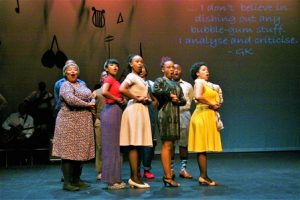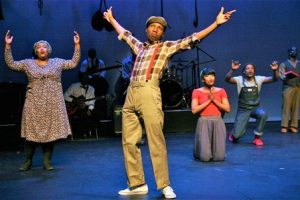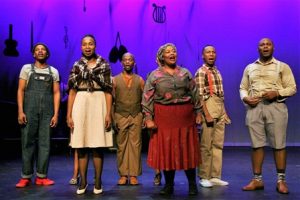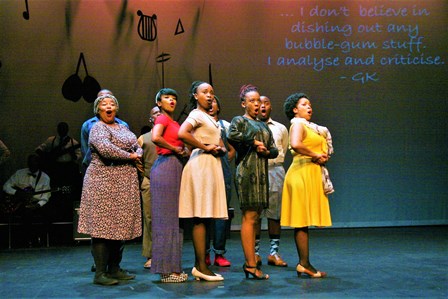
Thus would have colourfully painted those who flocked to the venue as klevas and manotchas van die galle jaart who turned out met hulle ousies om die ses stikkies om te sny – as they were transported back to die so- genoom dark days of grand Apartheid by the 11 member cast of lullaby-crooning cherries and agro-oozing dancing outies ; costumes including suspender belts, fedoras and soup-and-fish [black-n-white] two-toned brogues; set projecting monochromatic montage and defiant quotes of Bra Gib and a five-piece band featuring an unmissable black glossy grand piano a tingling familiar and nostalgic jazzy notes!
Among those who descended on the Jabulani entertainment spot were the usual suspects in the persons of African Footprint’s promoter, Richard Loring [who revealed that after 20 years and 4000 performances, his musical will be staging a comeback in 2018]; the Market Theatre’s James Ngcobo and omnipresent funny bone tickler, Mabutho Kid Sithole – for whom the occasion was poignant and tinged with nostalgia, since he disclosed that he, along with another recognisable figure, Duma ka Ndlovu – acted in one of Kente’s musical, Sikalo II at Mofolo Hall, back in the 70’s!
The three-week commencement of the musical tribute jostled for theatre-goers attention with the staging of the annual Abantu Book Festival, but at the risk of entangling in comparisons regarding renaissance propellers, it was obvious on the night as to whence curiosity led visitors.
Boasting a cast of 11, comprising six males numbering among them, award-winning performer, Billy Langa and five females who include television actress, Pulane Rampoana – they are ably backed by a creative team counting the likes of Soyikwa Institute of African Theatre-educated set and costume designer, Nthabiseng Makone and former Mmabana Arts and Culture Centre drama tutor and lighting designer, Orapeleng Sedi Moswane.
Musical numbers divided into Act One and Act Two and which blast forth yesteryear’s hits ranging from, Saduva to Uyadiphathapatha – are brought to bear onto the hammer-anvil-and-stirrup of the audience by Johan Mthethwa on piano; Mandla Buthelezi on trumpet/flugelhorn, Ntokozo Zungu on guitar; Tlotliso Hlabane on drums and Tumelo Kobeli on Bass guitar.
But the sonic side of the show is not only the responsibility of the band, as the crew, most notably the ladies such as Kingdom Life Bible Church Praise and Worship leader, Thembisile Khumalo [who started singing at the age of 5, according to the accompanying booklet] and Rampoana, a lyricist whose musical credits include, inter alia, Snow White – come out of their reverberating own in some of the stomping acts.
The musical’s director, Makhaola Ndebele has over two decades of insightful experience across various dramatic disciplines, and is a discerning professional who has worked in the arts industry variously as a theatre, television and film actor – in addition to being a dramatist and screenwriter; a theatre director; a dramaturge; a television producer and creative consultant.
His most recent performance work includes: Cantos of a Life in Exile [2015] which he wrote and performed; the 2016 Jody Foster directed Money Monster and with Zakes Mda’s The Mother of All Eating – being his recent directorial work.
Where Robert Sobukwe, Mirriam Makeba and Nelson Mandela left an indelible mark on our imagination, the late Gibson Kente, recognised as a culture luminary and father of township theatre – played an equally consequential role.
Plays like ‘How Long’, ‘I Believe’ and ‘Too Late’ amongst many others spoke to the heart of what indigenous South Africans experienced under a repressive and foreign regime.
It is from the townships that legends like him have gone to influence the cultural, economic and political landscape of South Africa and various parts of the globe often under extremely difficult circumstances. Not only did Gibson Kente produce plays, he created the music used in the pieces he directed as well.
Gibson Mthuthuzeli Kente was born in Duncan Village in East London but was raised in Stutterheim by his mother.
He was educated at Bethel Training College Seventh-Day Adventist College in Butterworth until he moved to Lovedale Training College to complete his matric.
In 1956 Kente moved to Johannesburg to study social work at the Jan H. Hofmeyr School of Social Work, something he didn’t complete – instead joining a group known as Union of South African Artists (Union Artists) who were based at Dorkay House in central Johannesburg and who offered black performers in South Africa training, royalty contracts and fair payment.
In 1963, Kente produced his first play, Manana, The Jazz Prophet, which featured celebrated musicians Caiphus Semenya and Letta Mbulu.
The play focused on Manana, a gospel preacher and prophet, whose main concern was to bring everybody to the Christian faith. In 1966, he wrote the musical Sikalo, which blended African gospel and township jazz. The musical was performed at the University of the Witwatersrand Great Hall.

Kente’s plays were popular for using township popular culture, slangs, fashion and topical issue to reflect on daily life. His success with his first two play motivated him to leave the Union Artists to start his own training center and production company, GK Productions.
He trained famous South African artists and entertainers such as Brenda Fassie, Nomsa Nene and Mbongeni Ngema in the garage of his home in Dube, Soweto. Kente also wrote music for artist such as Miriam Makeba and Letta Mbuli.
Three of his plays drew criticism for being anti-apartheid and were banned: How Long, I Believe and Too Late. He was jailed for one year in 1976 on conclusion of the filming of his play How Long.
The film was never released and the master negative of the film was given to the National Film Board in Pretoria. The National Film, Video and Sound Archives is the current custodian of this film.
First performed in 1975, his one-act play Too Late was banned by the Publications Control Board because it dealt with the death of Ntanana, a crippled girl, through brutal police action and apartheid bureaucracy. Another of his plays I Believe, was also banned. Another famous piece is Mama and the Load, considered by some to be his best.
In 1969 Kente was married to DRUM cover girl Evelyn Nomathemba Kasi and they had three children. They were divorced in 1979.
In 1989, his Soweto home was firebombed, resulting in the burning of early scripts and records. The garage at his home served as rehearsal room, set construction workshop, training center and storeroom for GK Productions.
It is estimated that before his death, between the years 1963 and 1992, Kente wrote 23 plays and three television dramas.
In 2003 he announced that he was HIV positive – a public admission which received praise from South African politicians, notably Nelson Mandela.
He was admitted into the care of a hospice in Soweto, where he was cared for until he died in his sleep. Kente was survived by two sons and three grandchildren. He had begun his last play, The Call, a musical about a man living with HIV who brings hope to others with the disease – when he was diagnosed HIV positive.
In 1997, the 30-seater Bra Gibson Kente Theatre was opened in Sharpeville – whilst in 1998, the Civic Theatre presented a tribute to him called A Tribute to Gibson Kente. Associate Professor Emeritus Rolf Solberg of Norway wrote an account of the playwright’s life and work in Bra Gib: Father of South Africa’s Township Theatre.

Offered former councillor and Soweto’s quintessential socialite, Sithole shortly after exiting the auditorium still euphoric from what he had just witnessed: “Social commentary is the job of the arts – a gem like Kente isn’t easy to document his life, because of complexities such as choreography!”
Forming part of Joburg City Theatre’s memory project with A Tribute to the Manhattan Brothers and Gone Native: The Life and Times of Regina Brooks having run their respective seasons in the beautiful 436-seater auditorium, it is only fitting that a commemoration of one of Africa’s favourite sons be listed too.
Theatre enthusiasts will be treated to a cornucopia of his great works in the staging of the musical.
The Gibson Kente Music Tribute began in Soweto Theatre’s main auditorium from December 5 to 17 2017.
Tickets are sold at R120, with early bird tickets at R80 available at the on-site box office or visit www.sowetotheatre.com and available at selected Pick ‘n Pay stores.
Plays:
- Manana the Jazz Prophet, 1963.
- Sikalo, 1966.
- Life, 1968.
- Zwi, 1970.
- How Long, 1974.
- Our Belief, 1974.
- Too Late, 1974.
- Can You Take It? 1977.
- Duma (It Thundered), 1980.
- Mama and the Load, 1980.
- The Call, 2003.

